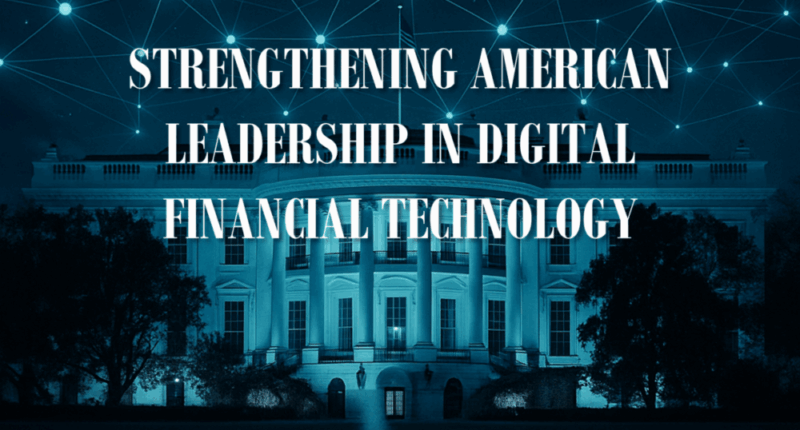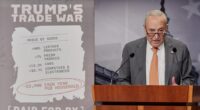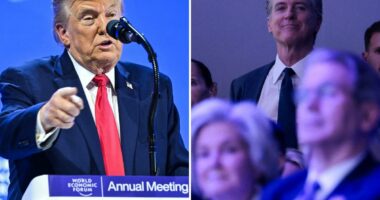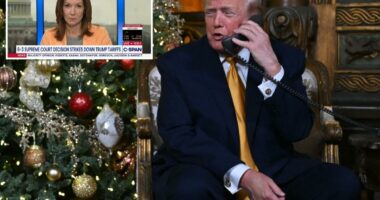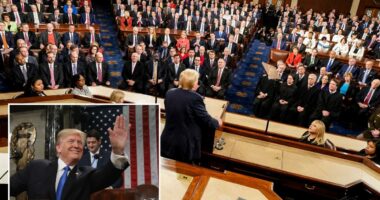Share this @internewscast.com
By Jason Meyers
The White House has unveiled the much-anticipated “Strengthening American Leadership in Digital Financial Technology” report. Initiated by Executive Order 14178 and crafted under the supervision of Special Advisor for AI and Crypto David Sacks, this 180-day initiative offers a pro-innovation strategy aimed at transforming the U.S. into the global “crypto capital.”
President Trump’s strategy eliminates regulatory excess, prohibits Central Bank Digital Currencies (CBDCs), and designates Bitcoin as part of a national strategic reserve. This goes beyond policy—it’s a bold challenge to outdated frameworks, with a promise to unlock massive economic potential.
Blockchain’s Grassroots Origins and Surging Popularity
Beginning with a robust endorsement of blockchain’s foundational principles, the report recognizes Bitcoin’s solution to the double-spending problem without the need for trusted intermediaries. It highlights the rapid ascent of crypto, noting that over 68 million Americans now own digital assets, and Trump’s popularity with crypto investors has risen to 72% as of June 2025. Enthusiasm among institutions is soaring—83% intend to increase their investments, driven by expectations of a $16 trillion market by 2030. The report critically reviews past policies, condemning the Biden Administration’s “Operation Choke Point 2.0” as a hindrance that forced innovation abroad, undermining America’s technological superiority.
Core Recommendations: Affirming Rights and Fostering Innovation
The report insists that Congress should safeguard self-custody rights, enabling Americans to hold digital assets independently and engage in direct transactions. This crucial topic was emphasized by SEC Chair Paul Atkins during his June 9th speech, where he described self-custody as a fundamental American principle. This move eliminates prosecution fears and grants developers the freedom to innovate across different sectors.
Revamping Digital Asset Market Structure
Regarding market structure, the report issues a robust directive: The SEC and CFTC must expedite federal trading of digital assets and propose new legislation to give the CFTC oversight of the spot market for non-securities like Bitcoin. DeFi receives robust support, with regulators being encouraged to evaluate “control” over assets rather than imposing blanket bans, while embracing technologies such as smart contracts, oracles, and cross-chain bridges to foster a more inclusive economy.
Overhauling Banking Regulations for Crypto Integration
The report calls for a complete overhaul of the banking sector. It highlights how previous administrations used regulations to block crypto firms’ access, likening these moves to discredited practices. Federal regulators are directed to implement technology-neutral risk management, revive innovation hubs, and clarify chartering procedures, ensuring capital requirements are based on actual risks rather than bias.
Championing Stablecoins and Banning CBDCs
Stablecoins are hailed as the U.S. dollar’s digital savior. The Working Group pushes for their global adoption to cement dollar dominance, while slamming CBDCs as threats to privacy, stability, and sovereignty. Congress should outright prohibit them domestically and lobby allies to follow suit, prioritizing private-sector upgrades to payments like cross-border tech.
Targeting Illicit Finance While Protecting Lawful Users
Illicit finance isn’t ignored—this report arms law enforcement without trampling rights. It proposes clarifying the Bank Secrecy Act for foreign actors, boosting info-sharing via FinCEN’s programs, and creating a “hold law” safe harbor for freezing suspect assets. Treasury gets marching orders to sanction bad actors, from ransomware gangs to state-sponsored hacks, while ensuring tools target criminals, not everyday users. Taxation rounds out the reforms: The IRS must issue guidance on staking, mining, and “wrapping” transactions, with Congress adding digital assets to wash sale rules and easing reporting burdens.
Bitcoin Strategic Reserve
But the crown jewel? The Bitcoin Strategic Reserve and U.S. Digital Asset Stockpile. Capitalized by forfeited crypto from seizures—without costing taxpayers a dime—this hoard will be managed by Treasury, with strategies to “stack sats” budget-neutrally. Bitcoin stays unsold as a reserve asset, signaling U.S. commitment to crypto’s scarcity and value. It’s a geopolitical masterstroke, positioning America as the guardian of digital gold.
Predictions for U.S. and Global Dominance
If implemented correctly, the U.S. surges as the undisputed crypto superpower, attracting billions in investment and talent back home. By 2030, expect a $5 trillion domestic market boom, with DeFi protocols handling 20% of global lending and USD stablecoins powering 50% of international payments, eroding rivals like China’s digital yuan. Globally, this sparks a “Trump Effect”: Allies adopt similar pro-innovation stances, while adversaries scramble amid U.S.-led sanctions on illicit chains.
CBDCs wither as private stablecoins dominate, fostering a freer, dollar-centric world economy. But risks loom—if Congress drags its feet, emerging hubs like Singapore or Dubai could steal the thunder, fragmenting finance and weakening U.S. hegemony.
This report isn’t incremental; it’s explosive—a hard fork from stagnation to golden age. Trump promised to make America crypto’s epicenter. With this roadmap, he’s delivering, igniting innovation that could rival the internet’s impact.
Click here to access the full report.
About the Author
Jason Meyers is the lead architect of Pacioli.ai, the world’s first web3 regulatory disclosure automation infrastructure. Jason is a former investment banker and took many companies public including Alexion Pharmaceuticals ($40 billion exit to AstraZeneca), VCA,($9 billion exit to Mars Inc) and Medarex, Inc ($2.5 billion exit to Bristol Myers). Follow @JasonMeyersNYC on X.
